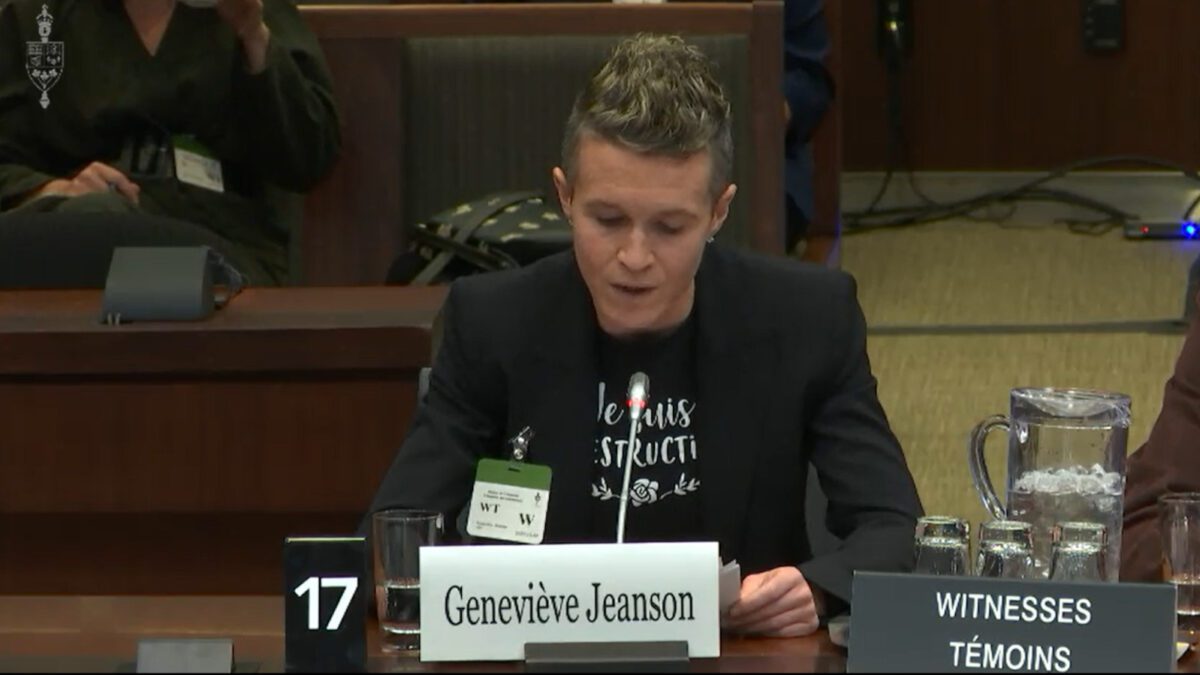Geneviève Jeanson gave a powerful testimony in Parliament on being a survivor
The cyclist described the abuse she endured from her coach and how she wants to help prevent it from happening again
 Photo by:
Parl.gc.ca
Photo by:
Parl.gc.ca
Former world champion and winner of Flèche Wallone, Geneviève Jeanson gave an emotional testimony in front of members of Parliament on Monday about the physical and sexual abuse she endured as a teenager from her coach. The Quebec native, wearing a shirt that read “je suis indestructible” spoke at a meeting of the the Standing Comittee of the Status of Women.
The former Olympian was banned for ten years after testing positive for the blood booster EPO in 2005. Her coach André Aubut as well as the doctor Maurice Duquette who gave her the drugs were banned for life in 2009. Aubut was also arrested in 2016 for spousal abuse with the woman he married after Jeanson.
“In less than two years, I became a victim of abuse and a cheater. Because doping is illegal in sports, I became a criminal in the world I lived in, all that at 16. I was a teenager without an escape route, with no one to talk to and no one to help me,” she said. She told members that at the age of 14 her coach hit her in the end to make her a stronger athlete.
Geneviève Jeanson: ‘Lyne Bessette was also a victim of my coach’
There were times she was so desperate to escape her lifestyle and abusive coach she even considered crashing herself. She wanted to get in an accident, “not one that would kill me, but one that would it all finally stop.” Looking back, she said, the positive test was the best thing to ever happen to her.
“Failing that drug test was the best thing that had ever happened to me. It meant that I could finally stop cycling and leave my coach. A positive drug test was just a small inconvenience and comparison to the hell I was living in,” the 41-year-old said. “Having my name tarnished forever was a cheap price to pay to finally get rid of him.”
Jeanson said she originally received only a few shots of EPO to treat her anemia, but she ended up doping her entire career.
On her former coach, Jeanson was blunt about the horrific reality she endured. “I was never the same person after that first sexual assault,” she explained. “Because I was living in constant violence, I actually believed that he could kill me and that he could commit suicide. It was so real that I couldn’t leave.”
She explained that Aubut compared being an athlete to living in the jungle, where only the strongest survive. That meant Jeanson was manipulated by him to think that assault would actually help her, to make her “tougher.” There was rarely a training session without violence, and her coach controlled everything in her life. Where she was allowed to go, who she was allowed to go out with, even her finances. Aubut would constantly remind her that she owed him and could not leave him, since he had left his wife and job to help her advance her career.
Jeanson concluded her testimony with recommendations, which included educating athletes at a young age about acceptable and unacceptable behaviour for coaches. Doing that, she said, would help them know how to react, and which resources are available.
“They need to understand there is no shame in asking for help.”
After the testimony which also included words from Allison Forsyth, a former skier and sexual abuse victim, Jeanson was optimistic her words would help effect change.
“I hope I had an impact,” she said. “I’m happy to add my voice to the ones of the other survivors to make things change.”
